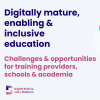DigiEduHack
DigiEduHack is an initiative by the European Institute of Innovation and Technology (EIT) within the European Commission's Digital Education Action Plan, led by the EIT Climate-KIC and coordinated by Aalto University in Finland, supported by other Ministries and public institutions. The goal of the initiative is to redefine learning through non-formal and vocational education with a strong focus on digital technologies and skills. DigiEduHack is a series of online and offline idea-hackathons happening all around the world during two days, focusing on co-creating the future of education at the digital age.
About DigiEduHack
DigiEduHack's hackathons are organised on a yearly basis in the form of open and free events for all. No coding skills or prerequisite knowledge of technology is required to take part. The hackathons are organised on a multilevel approach, offering approximately 50 challenges to participants. The challenges proposed are set up in a decentralised manner by education and research institutions of all levels, companies, non-governmental organisations (NGOs), and many others. The challenges are open to any European citizen, but primarily target at students, teachers, researchers, and innovators.
Why is this a good practice?
Many ideas and solutions developed during the hackathons have been highlighted as impactful, with the potential to contribute to the development of skills in education. The hackathons focus on key themes, such as emerging technologies for education, accessiblity or data-driven education, tackling all the aspects of digital education, lifelong learning and vocational education and training (VET). With such an approach, DigiEduHack creates a virtual environment and encompasses a global community, committed to continuous and lifelong learning.
DigiEduHack started in 2019, as part of the first Digital Education Action Plan of the European Commission. For its first five editions, it gathered nearly 10 000 participants from Europe and beyond. The initiative continues under the Digital Education Action Plan 2021-2027, with a long-term goal to support grassroots innovation and contribute to the objectives of the European Digital Education Hub.



